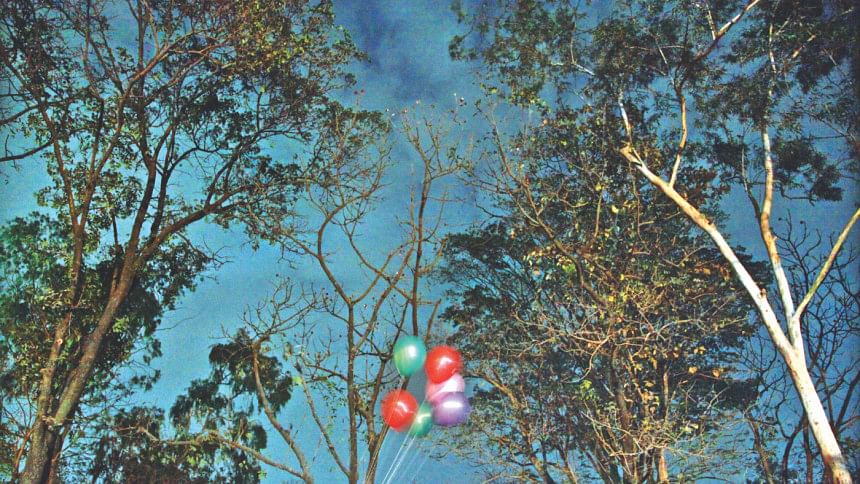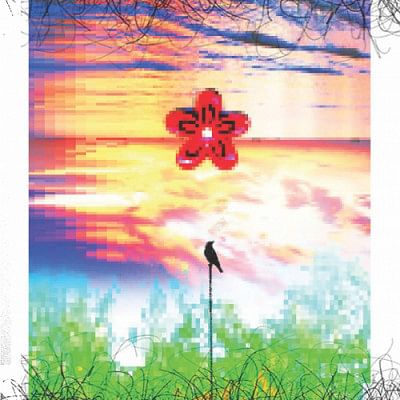The shepherd of floating dreams

I sometimes think of Dhaka as an ancient twisted folk tale—one with a mystical, rusty lamp with a faux genie. You can rub the relic, expecting some sort of triple-wish wizardry but will get mocked instead for even attempting such a foolish thing. Other times, I think of it as that scary bedtime story whispered to children in the shadows of the night to teach them the most frightening lesson of all—to not believe in magic. For Jamal though, the playful little boy with honey-coloured eyes, the charm of life had not yet dried up.
“But Baba, how do I know you are telling the truth?” Jamal had shouted after him the last time he saw his father, before he had walked out the door only to never enter it again. The only family he had ever known ceased to exist that day, when a four-wheeler driven in a drunken stupor collided with Jamal’s father on the road.
They had come to the ruthless capital driven south by the pangs of poverty before Jamal’s memory had fully crystallised. Jamal’s first recollection of his father was of him selling a plethora of balloons to a bunch of exuberant kids swarming him like insects on an unwrapped candy. His father had a bellowing laughter that rang louder than all the other balloon vendors. Jamal would look at him in awe, left speechless by his soaring spirits and spectacular sleight of hand even in the face of a cruel world. In their dingy, dim-lighted shanty, he treated Jamal’s ears to delightful stories of dungeons and dragons, fairies and fawns—all things otherworldly that should be kept away from a boy of six who would sooner or later be slapped by the merciless reality of their circumstances. As if predicting that Jamal would be left alone to fend for himself, his father also taught him everything about the trade.
Once, he confessed to Jamal how he whispered wishes into empty balloons before inflating them with helium. “You whisper your wishes, Jamal, and in that way you will feel a sense of ownership over your desires. The thread caught in your fingers will remind you that you are in control. You will be like a shepherd herding his floating dreams.”
“But I will have to sell those balloons, won’t I? Age is turning your brain into mush, Baba,” Jamal teased him.
At this, his father chuckled and replied, “But not everyone can be a seller of dreams, Jamal. Many out there claim to be, but they aren’t. You can be one secretly. And one day, you might just have these wishes granted if you believe in the magic. When you whisper a wish into the universe, it might just find a way to materialise, because you are one tiny important detail in its gigantic puzzle.”
His father had looked like a wise old tree, an anachronism, and imparting these words, he had left the house for his usual work day. Jamal had shouted after him, “But Baba, how do I know you are telling the truth?”
The question would never be answered. After his father’s accident, a stranded Jamal went to live with a distant uncle who helped him start his own balloon selling trade. A year passed and Jamal became camouflaged in the wretched penury of the city. Just another being stripped of all hope, selling balloons to kids his own age.

One chilly afternoon, while filling balloons with helium, Jamal suddenly thought of his father. Life had been so different since his demise—it seemed like along with his Baba, all the magic too had packed its bags in the wee hours of the morning and left Jamal without even leaving a note. But now he did what his father had once ambitiously taught him. He whispered something into a red balloon before inflating it—a wish to go to an amusement park. He attached the balloon with a string and tied it around a separate figure, adamant to hold on to it, to feel the weight of his dreams pulling at his little hands.
The day did not see any profit. The demand for balloons in the area, it seemed, was wavering. Not having earned enough to return home to his uncle, Jamal thought of spending the night on a bench and was packing his things, when a shiny black car stopped in front of him. A man in his late thirties rolled down the window and asked for the shiny red balloon in which was safely tucked Jamal’s little wish of going to a carnival. Stomach growling from hunger, Jamal reluctantly sold it off, relieved at least at the thought of making it home for some food.
The man, on the other hand, was having a splendid night. He had gotten a much-awaited promotion and was on his way to celebrate with his family. He bought the balloon for his little girl and beamed at the idea of taking her to one of the grandest amusement parks in the world. A few weeks later, he entered the grand gates of the park, erupting with innocent screams and laughter, holding his daughter’s hand while she licked a cone of ice-cream. In a different time zone, back in Dhaka, Jamal stood in front of a local park under a scorching sun, inviting people to buy his balloons and looking at families entering with kids. It made him think of his old man’s words.
To commemorate his Baba’s faith in the magic of the universe, Jamal started whispering his wishes into balloons quite often. They would range from buying toy cars, getting new clothes to scrounging up three meals a day. He felt closer to his father whispering into the balloon, as if Baba were watching him from somewhere, chuckling with delight. He felt he was secretly doing the world a favour by selling his dreams. And he felt content. Little did he know that all his wishes, by some mystical power of the universe, were being granted to whoever received his balloons—that the world which bore witness to the playful frolics of an old man and his innocent son actually incorporated their ideas into its grand scheme. Unknowingly, Jamal had become a seller of dreams.
One day, Jamal witnessed something he had never experienced before. A boy of his age tripped and scraped his knee near Jamal’s balloon stand. His parents came rushing, scooped him up and planted kisses on his face. Their love-stricken, worried faces reminded Jamal of his Baba. A tear trickled down his cheek. When he picked the first balloon to be inflated that day, he whispered into it something he had never asked for before, “I wish I was loved.” But he failed to sell a single balloon that day. It was an off day, and he had not made enough even to afford some lunch or snacks. On top of that, with the night drawing near and no new customers in sight, he would have to worry about storing the helium-heavy cluster of balloons with him, an added responsibility for an already weakening little body deprived of food, rest, and hope.
He looked up at the sky that had a moment ago looked orange. Now they were closer to a shade of one of his balloons—not quite blue, but not quite green either. The canopy looked warm and velvety and enveloping, and yet it allowed for the trees beneath it to glow as if with a light of their own. How did they do that?
A woman tapped his shoulder from behind before Jamal could complete the thought. She had picked up the remaining bouquet of balloons from his stand, and she paid him the amount that would cover the cost for the bunch. Jamal pocketed the money, all thought of skies and trees and magic momentarily wiped from his mind. He looked up to find the woman still standing there. She held out the balloons to him.
“Here, these are for you.”
Iqra L Qamari is a student of North South University and a contributor to The Daily Star. Reach her at iqra.kashmir53@gmail.com

 For all latest news, follow The Daily Star's Google News channel.
For all latest news, follow The Daily Star's Google News channel. 



Comments